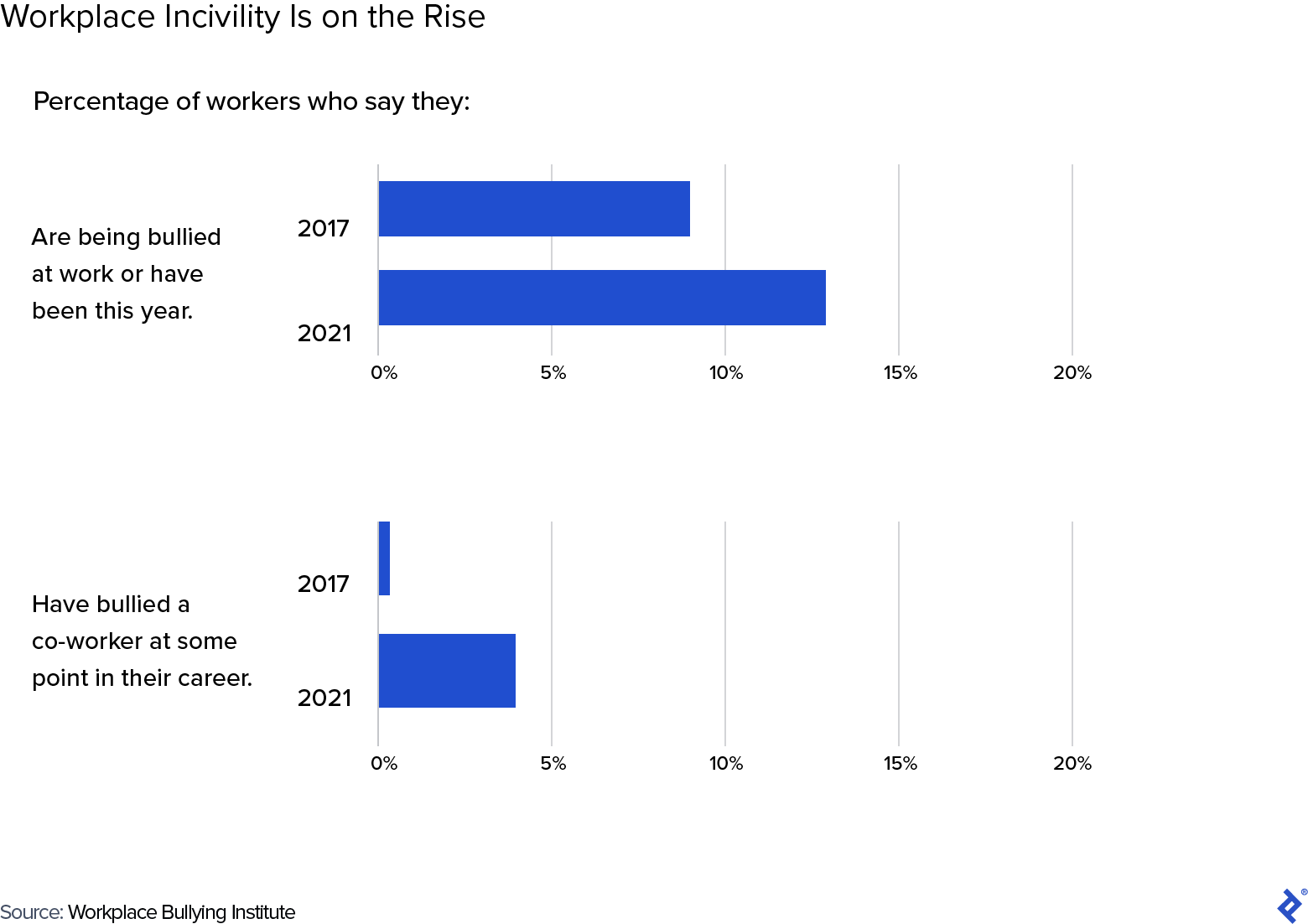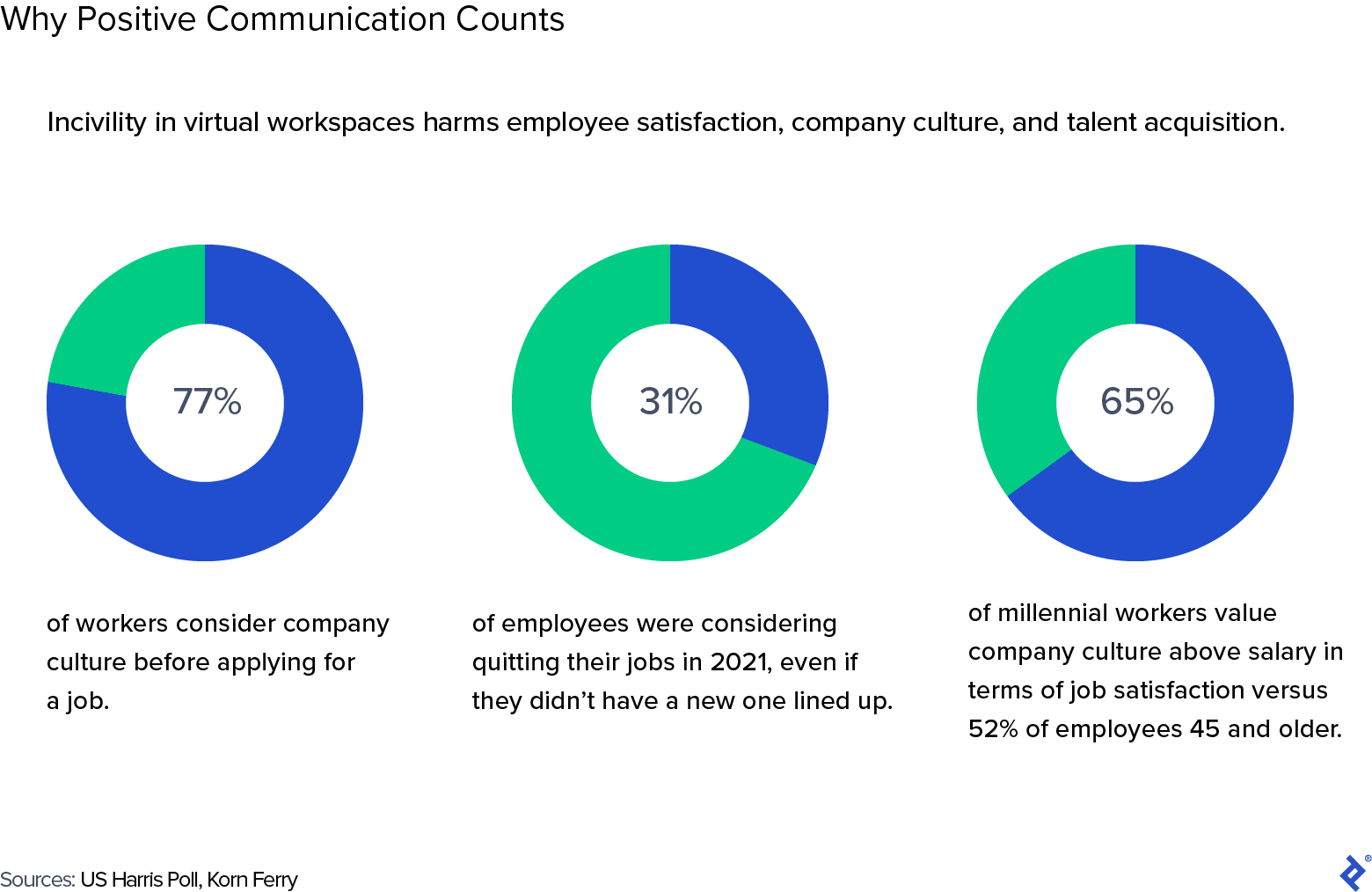Toxic Communication in Virtual Workspaces: A Looming Liability for Remote and Hybrid Companies
The tendency to “speak” more harshly from a keyboard than you would face to face—called online disinhibition—doesn’t just happen on Twitter. When it creeps into office conversations, it can create a toxic work environment that damages your brand and bottom line.
The tendency to “speak” more harshly from a keyboard than you would face to face—called online disinhibition—doesn’t just happen on Twitter. When it creeps into office conversations, it can create a toxic work environment that damages your brand and bottom line.

Jeffrey Gangemi
Jeffrey is a digital growth strategist with Accenture Interactive and an alum of Telus International. He has an MBA from Cornell University with an emphasis in leadership and innovation.
Featured Experts
We’ve all seen it happen: Someone blows their stack on Twitter or types a scathing commentary on a subreddit thread. This behavior is fueled in part by online disinhibition, a phenomenon in which people feel free to be much harsher in anonymous and asynchronous communication than they would be on a call or face to face.
Toxic disinhibition can seep into the virtual workplace too, and the global migration to remote and hybrid work since the beginning of the COVID-19 pandemic has created more opportunities for incivility. In 2017, just 19% of employees reported ever having been bullied at work, according to a survey by the Workplace Bullying Institute. That number jumped to 30% in 2021—43% for fully remote workers.
“Bullying hasn’t disappeared during the pandemic—rather, it has simply moved online, with virtual platforms now being the most common sites for such behaviors,” David Yamada, JD, a professor of law and Director of the New Workplace Institute at Suffolk University Law School in Boston, tells Toptal.

Neither bullying nor incivility are likely to violate the law, unless the behavior is retaliation for whistleblowing or motivated by a protected class status such as race, sex, sexual orientation, and other categories, Yamada says. That said, toxic conversations at work have many other clear liabilities for businesses and bottom lines.
Toxic Virtual Talk Hurts Employee Engagement and Productivity
Workplace bullying is commonly defined as repeated spiteful, mocking, or intimidating behavior. Uncivil online behaviors at work may include one-offs like leaving unduly harsh feedback in a Google Doc, using ALL CAPS in an email, or making a joke at a co-worker’s expense in a public Slack channel, says Lauren Park, PhD, an HR research scientist at SAP SuccessFactors, a division of the global IT and software solutions company SAP.
Although seemingly less severe than bullying, garden-variety incivility can also have far-reaching and insidious effects, Park tells Toptal.
People often hesitate to confront their coworkers about rude virtual messages because it’s hard to be certain of a person’s tone or intention over Slack or email. That ambiguity and avoidance leads to stressful rumination, bitterness, and unresolved conflict, says Park. “When you’re experiencing incivility and don’t know the intent, there’s a lot of rumination as you try to parse the behavior and your response to it.”
Unfortunately for today’s knowledge workers, people may be less likely to talk through work concerns with managers and co-workers while working remotely. In a February 2021 study by Crucial Learning, 54% of employees said they let concerns go unresolved for weeks before saying something—versus 22% percent before the COVID-19 pandemic and the resulting shift to remote work.
These unresolved issues led to more stress and time wasting, and lower morale and productivity, the survey found. “The less you say, the more room you have for people to guess about what your intentions are, for misunderstanding, and to fill in the blanks in the worst possible way,” says Justin Hale, a master trainer at Crucial Learning, a corporate education company with courses utilized by leaders and employees of NASA, AT&T, Lockheed Martin Corp., and nearly half of the Forbes Global 2000.
The best way to dispel rumination is to encourage remote and hybrid employees to lean into difficult conversations and offer education on how to do it well, says Hale. He recommends a three-step process: Share the facts as you understand them, tell your story (including how you feel), and then ask for other perspectives.
High-stakes conversations should be had face to face or on an audio or video call in order to keep misunderstanding, ambiguity, and toxic disinhibition at a minimum, he says.
Incivility Can Cripple Recruitment and Retention Efforts
In the age of social media, employees who are unhappy with the communication norms and culture at work can damage a company’s reputation fast. When the chief executive of a large online real estate company laid off 900 employees over Zoom in 2021, for example, the resulting uproar went viral. At a high-end luggage company with a cult following, complaints of toxic communications over Slack and a resulting investigation by journalists eventually sent the CEO packing in 2020.

Even without a big media splash, there’s an enormous risk that unhappy current and former employees will pummel an organization through anonymous ratings and reviews on sites such as Glassdoor and Indeed. A 2019 Randstad USA survey of 1,200 HR professionals and workers found that 66% of managers don’t believe bad online reviews hurt their ability to attract job candidates. But 57% of workers in the survey said they wouldn’t apply to a company with negative reviews. In today’s tight labor market, job candidates can afford to be even more discerning.
“I’ve never seen the labor market so tight, and culture matters now more than ever. Word travels fast, and employees are an HR department’s best recruiter—or their biggest detractor,” says Mallory Martino, CHRO of Bic, a global leader in the manufacturing of pens, lighters, and other everyday consumer goods.
Related: Treating Remote Employees Fairly in a Hybrid Workplace
As for attrition, while digital incivility may not be the sole reason someone leaves a job, “it’s certainly going to be a contributor,” says Park. Yamada agrees: “Especially during the so-called Great Resignation, employees who feel disrespected … have more opportunities to walk and land on their feet.” A January 2022 study by MIT researchers found that a toxic culture is the strongest predictor of attrition. Culture was 10 times more important than salary in predicting quit rates. One of the main contributors to a toxic environment, the study found, was workers feeling disrespected.
At Bic, Martino put firm guardrails in place to protect the company’s collegial culture when the pandemic forced workers to go remote. “We actually grew up as a manufacturing company, so office hours reflected shop-floor hours,” she tells Toptal. “Prior to COVID, we were in the office five days a week. Our culture was very relationship-driven, so it was a massive transition for us to go remote.”
To ease some of that transitional challenge, Martino and her team instituted several blanket rules for company communications. One rule requires everyone—even the executive team—to raise their hand to speak in virtual meetings in order to reduce stiff hierarchies and give employees more of an equal voice no matter their positions.
Bic also has a code of business conduct that sets clear expectations for team member behavior. “Regardless of where we are working, we are unwavering on how we expect our team members to work,” says Martino. Her team also maintains a formal, confidential process to ensure that behavior that violates the code is investigated carefully and confidentially, and addressed by a senior group of HR and legal team members.
“We know that team members will not just stay at Bic, but they will go above and beyond [for the company] if they have a positive day-to-day experience,” she says.
Solving the Problem of Toxic Work Environments in the Age of Remote Work
There have been times when Bic employees expressed difficulty with the company’s shift to remote and hybrid work, Martino admits—but that wasn’t the norm. “That’s because we focused on the care and well-being of our employees. If you don’t, then you risk much more uncivil behavior in the workplace,” she says. “We are driving an ambitious growth agenda and know that in order to achieve our goals for the future of Bic, our team members must be at their best every day. Without question, their wellness and engagement is a key driver of their individual and our collective performance.”
Civility and kindness on smaller teams may be even more important than the larger companywide culture, research by Ashley Goodall, Senior Vice President of Leadership and Team Intelligence at Cisco, suggests. That’s one reason why leaders at McKinsey and Company are laser-focused on building positive team microcultures, says Nicholas Lovegrove, a professor of management at Georgetown University and a former senior partner at McKinsey.
At the outset of every McKinsey project, employees develop team charters that detail how the work will be split up, the individual working styles of the members, what the meeting cadence will be, and how they’ll give each other feedback. Then, the positivity and success of the microculture is evaluated at regular intervals to make sure employees feel safe, heard, and positive about their work.
Research that Park conducted while at Portland State University offers yet another pathway to better behavior in digital workspaces: autonomy. Employees with more control over their jobs are less likely to reciprocate incivility, she found. Park suspects that people with more autonomy may be better able to detach from work and may have more time to reflect or seek support. Whether remote or in person, employers should explore ways to give workers more control over how and when their work tasks are completed, she says.
To protect their employees, their brands, and their bottom lines, leaders cannot wait to act until complaints of toxic interactions surface. Rather, they must proactively create a unifying virtual culture and set clear digital workspace expectations. Overindexing on programs, activities, and remediation efforts that support civility will set up your hybrid or remote workplace for success now and for years to come.
Related: Fortune 500 Executives on Remote Work: Then and Now
